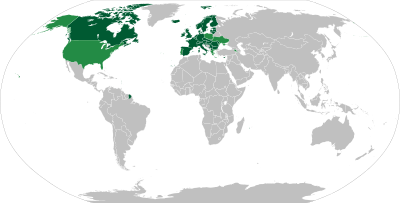 Global Information
Global InformationAarhus Protocol on Persistent Organic Pollutants information

The Aarhus Protocol on Persistent Organic Pollutants, a 1998 protocol on persistent organic pollutants (POPs), is an addition to the 1979 Geneva Convention on Long-Range Transboundary Air Pollution (LRTAP). The Protocol seeks "to control, reduce or eliminate discharge, emissions and losses of persistent organic pollutants" in Europe, some former Soviet Union countries, and the United States, in order to reduce their transboundary fluxes so as to protect human health and the environment from adverse effects.[1]
Authors and promoters of the Protocol were the United Nations Economic Commission for Europe (UNECE), which at the time housed 53 different country members and alliance. The protocol was amended on 18 December 2009: the Amendments to the Text and to Annexes I, II, III, IV, VI and VIII to the 1998 Protocol on Persistent Organic Pollutants came into force on 20/01/2022 and the Amendments to Annexes I and II to the 1998 Protocol on Persistent Organic Pollutants came into force on 26/02/2023.
As of May 2013, the protocol has been ratified by 31 states and the European Union.
In the United States, the protocol is an executive agreement that does not require Senate approval. However, legislation is needed to resolve inconsistencies between provisions of the protocol and existing U.S. laws (specifically the Toxic Substances Control Act and the Federal Insecticide, Fungicide, and Rodenticide Act).
- ^ "PROTOCOL TO THE 1979 CONVENTION ON LONG-RANGE TRANSBOUNDARY AIR POLLUTION ON PERSISTENT ORGANIC POLLUTANTS" (PDF). 1979. pp. 1–49.